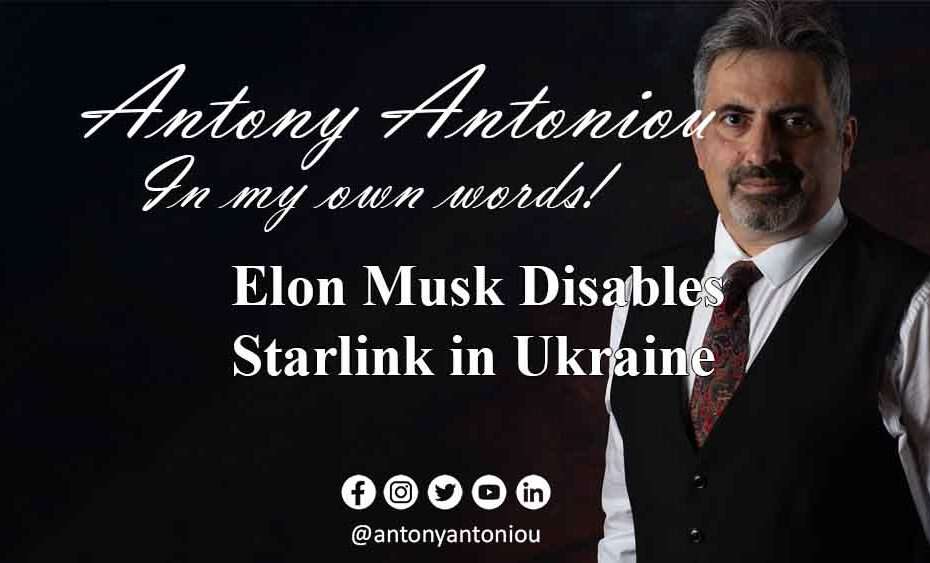Elon Musk Disables Starlink in Ukraine
Elon Musk’s Starlink Dilemma: A Balancing Act Amidst Geopolitical Tensions
Introduction:
Elon Musk, the maverick entrepreneur behind SpaceX and Tesla, recently found himself at the center of a controversy involving his Starlink communications network and the ongoing conflict in Crimea. The story unfolds against a backdrop of geopolitical tension, with accusations of complicity, evil deeds, and moral dilemmas. In this blog post, we will delve into the details of this intriguing saga.
A Refusal to Provide Access:
Elon Musk revealed that he had refused Kyiv’s request for access to Starlink over Crimea to avoid being drawn into what he called a “major act of war.” Kyiv had sought an emergency request to activate Starlink in Sevastopol, a city housing a significant Russian naval port.
The Allegations and Accusations:
This controversy erupted after the release of Walter Isaacson’s biography of Elon Musk. The book alleged that Musk had turned off Starlink to thwart a drone attack on Russian ships. A senior Ukrainian official accused him of “committing evil” by enabling Russian attacks on civilians.
The Ukrainian official claimed that by denying access to Starlink, Musk allowed Russian naval vessels to participate in deadly attacks on civilians, including firing Kalibr missiles at Ukrainian cities. The accusatory tone towards Musk was palpable, with questions raised about whether he was inadvertently aiding war criminals.
SpaceX’s Role:
SpaceX, where Elon Musk is the largest shareholder, had been providing thousands of Starlink satellite dishes to Ukraine following Russia’s full-scale assault on its neighbor in February of the previous year. These satellite terminals were crucial for maintaining internet connectivity and communication in Ukraine as the conflict disrupted the country’s infrastructure.
Musk’s Response:
In response to the allegations in Isaacson’s book, Musk denied deactivating Starlink and clarified that it had not been activated in those regions in the first place. He revealed that there was an emergency request from government authorities to activate Starlink in Sevastopol, with the apparent intent of sinking a significant portion of the Russian fleet at anchor.
Musk’s firm refusal stemmed from his belief that complying with the request would make SpaceX explicitly complicit in a “major act of war” and escalate the conflict further. He emphasized that Starlink was never intended to be used for long-range drone strikes but rather for peaceful purposes like education and entertainment.
Geopolitical Background:
To understand the gravity of the situation, it’s essential to note that Russia had illegally annexed Crimea in 2014, eight years before launching its full-scale invasion of Ukraine. The region has been a focal point of international tension.
Musk’s Plea for Peace:
In addition to defending his position, Musk offered a personal opinion, calling for a truce in the conflict. He argued that Ukrainians and Russians were losing their lives over “small pieces of land” and that such sacrifices were not worth the territorial disputes.
Controversial Proposals:
Musk had previously sparked controversy by proposing a plan to end the war, suggesting the formal recognition of Crimea as part of Russia and allowing residents of seized regions to vote on their preferred country. This proposal received criticism, with Russian chess grandmaster Garry Kasparov labeling it as “moral idiocy.”
Conclusion:
Elon Musk’s refusal to provide access to Starlink over Crimea highlights the intricate ethical and geopolitical challenges faced by technology giants in a world marked by conflict. As tensions persist, Musk’s actions raise profound questions about the role of technology in international disputes and the moral responsibilities of those who control it. The story continues to evolve, underscoring the complex interplay between innovation, geopolitics, and the quest for peace in a troubled world.

